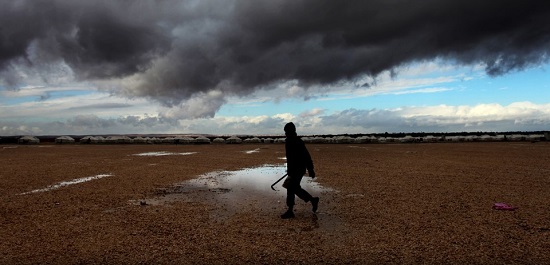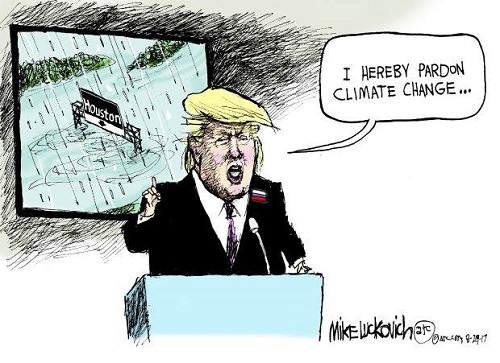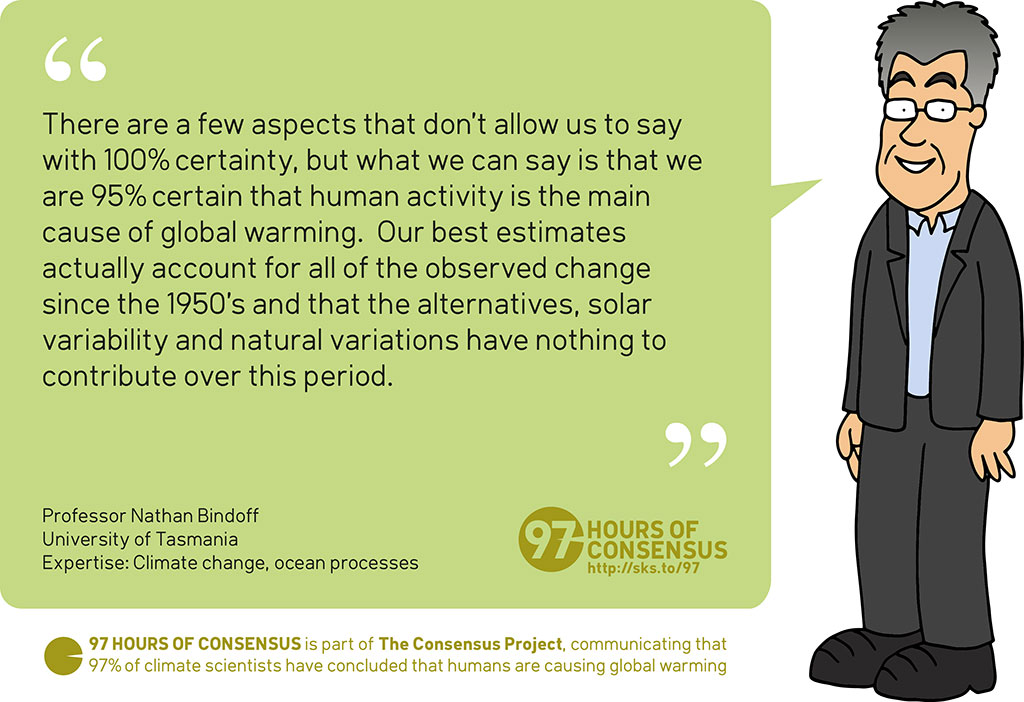 A Syrian refugee walks toward his tent at Zaatari refugee camp through puddles and in front of storm clouds.
A Syrian refugee walks toward his tent at Zaatari refugee camp through puddles and in front of storm clouds. Story of the Week... Editorial of the Week...Toon of the Week... Coming Soon on SkS... Poster of the Week... Climate Feedback Reviews... SkS Week in Review... 97 Hours of Consensus...
The Strange Future Hurricane Harvey Portends
 A Syrian refugee walks toward his tent at Zaatari refugee camp through puddles and in front of storm clouds.
A Syrian refugee walks toward his tent at Zaatari refugee camp through puddles and in front of storm clouds. Humans have begun an international project to move water around the world, far more ambitious than any network of aqueducts or hydroelectric dams ever constructed or conceived. The drivers of this global system are billowing vapors, which trap heat and propel the world’s water faster and farther around the globe. The first results of this project may already be seen in the outrageous rainfall totals of storms like Hurricane Harvey, or in landslides on remote mountain hillsides, and even in the changing saltiness of the oceans.
The Earth system is getting warmer. Water is evaporating faster. There’s more of it in the air. It’s moving through the system faster. As a result, the coming centuries will play out under a new atmospheric regime, one with more extreme rain, falling in patterns unfamiliar to those around which civilization has grown.
“Basically the idea is that as the climate warms there’s more energy in the atmosphere,” says Gabriel Bowen, a geochemist at the University of Utah. “That drives a more vigorous water cycle: Evaporation rates go up, precipitation rates go up—there’s just more water moving through that cycle faster and more intensely.”
For each degree Celsius of warming the atmosphere is able to hold 6 percent more water. For a planet that’s expected to warm by 4 degrees by the end of the century, that means a transition to a profoundly different climate.
“Rainfall extremes have increased in intensity I think at every latitude in the northern hemisphere,” says Massachusetts Institute of Technology climate scientist Paul O’Gorman.
The Strange Future Hurricane Harvey Portends by Peter Brannen, The Atlantic, Aug 31, 2017
Harvey should be a warning to Trump that climate change is a global threat
As rains fell and floodwaters rose in Houston, President Trump took to Twitter with an “oh, gosh” tweet: “Wow - Now experts are calling #Harvey a once in 500 year flood! We have an all out effort going, and going well!”
How refreshing it is when the president directs our attention to the words of experts — people who ascertain facts, study the issues, dissect the causes of problems, and put their biases and suppositions aside to figure out solutions.
If Trump himself were to consult the experts — such as, you know, climate scientists — he would learn that global warming is real. He’d also learn that although warming did not cause Hurricane Harvey, it certainly makes such storms stronger, more unpredictable and quicker to intensify. Experts — there’s that word again — say that warmer air temperatures mean more evaporation of moisture from the seas to the skies, and thus more rainfall from storms. Warmer seas — including the Gulf of Mexico — intensify storms, from their size to their wind speeds, and amplify storm surges. (In southeast Texas, the flat geography allows a surging Gulf to intrude farther inland.) Another wrinkle, according to atmospheric scientist Michael E. Mann: Climate change modeling suggests that human-propelled global warming could lead to weaker prevailing winds and a jet stream tracking father north. And that appears to have been what led Harvey to park over southeast Texas and dump more than 40 inches of water in places rather than spreading the rain (and pain) around or drifting back out over the Gulf.
Harvey should be a warning to Trump that climate change is a global threat, Opinion by Editorial Board, Los Angeles Times, Aug 30, 2017


Climate Feedback asked its network of scientists to review the article, Did Climate Change Intensify Hurricane Harvey? by Robinson Meyer, The Atlantic, Aug 27, 2017
Three scientists analyzed the article and estimated its overall scientific credibility to be ‘high’ to ‘very high’.
A majority of reviewers tagged the article as: Insightful.
The Atlantic accurately explores climate context for Tropical Storm Harvey, Climate
Feedback, Aug 29, 2017

Quote provided by email
High resolution JPEG (1024 pixels wide)
Posted by John Hartz on Sunday, 3 September, 2017
 |
The Skeptical Science website by Skeptical Science is licensed under a Creative Commons Attribution 3.0 Unported License. |